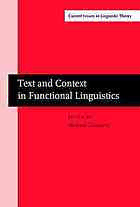
Text and Context in Functional Linguistics PDF
Preview Text and Context in Functional Linguistics
TEXT AND CONTEXT IN FUNCTIONAL LINGUISTICS AMSTERDAM STUDIES IN THE THEORY AND HISTORY OF LINGUISTIC SCIENCE General Editor E.F. KONRAD KOERNER (University of Ottawa) Series IV – CURRENT ISSUES IN LINGUISTIC THEORY Advisory Editorial Board Raimo Anttila (Los Angeles); John E. Joseph (Edinburgh) Hans-Heinrich Lieb (Berlin); Ernst Pulgram (Ann Arbor, Mich.) E. Wyn Roberts (Vancouver, B.C.) Volume 169 Mohsen Ghadessy (ed.) Text and Context in Functional Linguistics TEXT AND CONTEXT IN FUNCTIONAL LINGUISTICS Edited by MOHSEN GHADESSY University of Brunei Darussalam JOHN BENJAMINS PUBLISHING COMPANY AMSTERDAM/PHILADELPHIA TM The paper used in this publication meets the minimum requirements of American 8 National Standard for Information Sciences — Permanence of Paper for Printed Library Materials, ANSI Z39.48-1984. Library of Congress Cataloging-in-Publication Data Text and context in functional linguistics / Mohsen Ghadessy [editor]. p. cm. -- (Amsterdam studies in the theory and history of linguistic science. Series IV, Current issues in linguistic theory, ISSN 0304-0763 ; v. 169) Includes bibliographical references and indexes. 1. Context (Linguistics) 2. Discourse analysis. 3. Functionalism (Linguistics) I. Ghadessy, Mohsen, 1935- . II. Series. P325.5.C65T48 1998 410’.1’8--dc21 98-50930 ISBN 90 272 3674 7 (Eur.) / 1 55619 885 X (US) (Hb; alk. paper) CIP © 1999 – John Benjamins B.V. No part of this book may be reproduced in any form, by print, photoprint, microfilm, or any other means, without written permission from the publisher. John Benjamins Publishing Co. • P.O.Box 75577 • 1070 AN Amsterdam • The Netherlands John Benjamins North America • P.O.Box 27519 • Philadelphia PA 19118-0519 • USA Table of Contents Foreword vii Notes on the Contributors ix Introduction xi 1. The notion of “context” in language education 1 M. A. K.Halliday 2. Modelling context: a crooked path of progress in contextual linguistics 25 J. R.Martin 3. Context in dynamic modelling 63 MichaelO’Donnell 4. Acting the part: lexico-grammatical choices and contextual factors 101 GeoVThompson 5. Textual features and contextual factors for register identification 125 MohsenGhadessy 6. Investigating institutionalization in context 141 WendyL.Bo wcher 7. Context, material situation and text 177 CarmelCloran 8. Speaking with reference to context 219 RuqaiyaHasan vi TABLEOFCONTENTS Name Index 329 Subject Index 333 Foreword The shift towards a functional (sociolinguistic) approach to the analysis of languageinthelastfewdecadeshasnecessitatednewdefinitionsandmodelsfor a number of concepts that linguists have taken for granted for a very long time. Twoofthemainareasofconcernhavebeen:Whatistext?and,Whatiscontext? The present volume attempts to demystify these important notions by providing clear definitions and a number of theoretical models by analysing relevant exampleswithintheassumptions ofSystemicFunctionalLinguistics(SFL).The eight chapters collectively present a comprehensive picture of the fundamental issues in text analysis and context modelling not given in any other single volumetodate.Allthecontributorsbasetheiranalysesongenuinedatacollected from a variety of spoken and written registers of contemporary English. Notes on the Contributors WendyBowcher is Associate Professor in the Department of Foreign Languages andLiteratureatTokyoGakugeiUniversity,Japan.Herresearchinterestsinclude context and language, English intonation, and applications of SFL to TESOL. She is currently completing a doctoral dissertation on the relation between context, language and institutionalisation focusing on radio sports commentary. CarmelCloranspentsomeyearsatMacquarieUniversityworkingwithRuqaiya Hasan on her semantic variation project and teaching systemic functional linguistics. She taught semantics in the Department of English Language and Literature at the National University of Singapore. She is currently back in Australia working on research into aspects of child language development, and developing “student friendly” texts on (i) some discourse analytic tools, and (ii) the use of networks in linguistic investigation. She co-edited (with David Butt and GeoV Williams) a collection of Hasan’s papers entitled Ways of saying: WaysofMeaning, published by Cassell in 1996. Mohsen Ghadessy is a Professor in the Department of English Language and Applied Linguistics at the University of Brunei Darussalam. He has taught English language and applied linguistics courses in a number of countries including USA, UK, Iran, Singapore and Hong Kong. His research interests includelanguageteaching,writtenregisters,andthematicorganisation.Hisrecent publications incl ude three edited books, Registers of Written English, Pinter, 1988; RegisterAnalysis:TheoryandPractice, Pinter, 1993 and ThematicDevel- opmentinEnglishTexts, Cassell, 1995. Michael Halliday is Emeritus Professor of Linguistics (University of Sydney). His research interests cover every area of language from social context right through to phonology. His most recent major publications are WritingScience: Literacy and Discursive Power (co-authored with J.R. Martin), Falmer Press, x NOTESONTHECONTRIBUTORS 1993; LanguageinaChangingWorld, Occasional Papers No. 13 ALAA, 1993; andIntroductiontoFunctionalGrammar(2ndedition),EdwardArnold,1994.He has received honorary degrees from several universities in Europe and Asia. RuqaiyaHasan is Professor Emerita of Linguistics (Macquarie University). Her research interests include stylistics, discourse analysis, lexis and grammar, semantic networks and socio-semantic variation. Her most recent publications include “Contexts for Meaning” in Language, Communication and Meaning, editedbyJ.E.Alatis,GeorgetownUniversityPress,1993;“OnSocialConditions for Semeotic Mediation: The Genesis of Mind in Society” in Knowledge and pedagogy: The Sociology of Basil Bernstein edited by A.R. Sadovnik, Ablex, 1995. She has most recently edited Literacy in Society (with GeoV Williams), Longman,1996;OnSubjectandTheme:ADiscourseFunctionalPerspective(with Peter H. Fries) and Functional Descriptions (with Carmel Cloran and David Butt), both published by Benjamins, 1995 and 1996, respectively. Dr. J. R.Martin is currently Associate Professor of Linguistics at the University of Sydney. His research interests include systemic theory, functional grammar, discoursesemantics,register,genre,multimodalityandcriticaldiscourseanalysis, focusing on English and Tagalog — with special reference to the transdisciplinary fields of educational linguistics and social semiotics. Relevant publications include English Text: System and Structure, Benjamins, 1992; Writing Science: LiteracyandDiscursivePower (With M.A.K. Halliday), Falmer, 1993; Working with Functional Grammar (with C. Matthiessen & C. Painter), Arnold, 1997; GenreandInstitutions:SocialProcessesintheWorkplaceandSchool(editedwith F.Christie),Cassell,1997;ReadingScience:CriticalandFunctionalPerspectives onDiscourseofScience (edited with R. Veel), Routledge, 1998. Dr. Michael O’Donnell is a Research Fellow in the Department of Artificial Intelligence at the University of Edinburgh. He completed his Ph.D. at the University of Sydney, 1994. He has worked on several projects involving machine impleme ntation of linguistic theory. GeoVThompson is a lecturer in the Applied English Language Studies Unit of the Department of English Language and Literature at the University of Liver- pool. His research interests centre on projection (reported speech), evaluation in discourse, and interaction in both written and spoken text. Recent publications includeReporting,1994andIntroducingFunctionalGrammar,1997.Hehasco- edited (with Susan Hunston) a collection of papers on Evaluation in Text: AuthorialStanceandtheConstructionofDiscourse, 1999.
